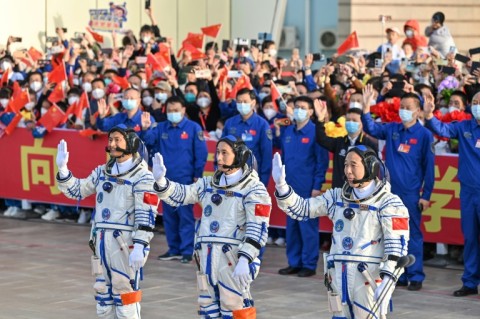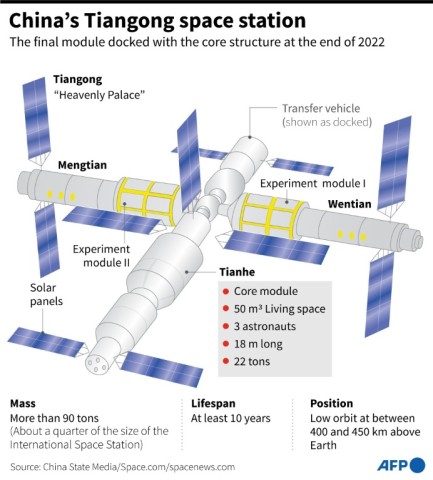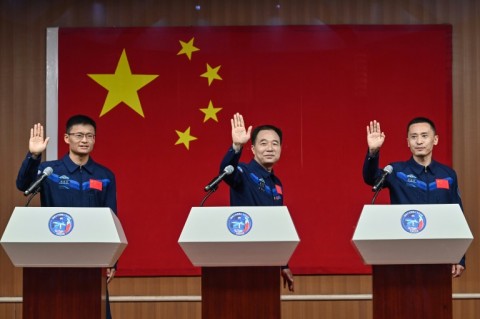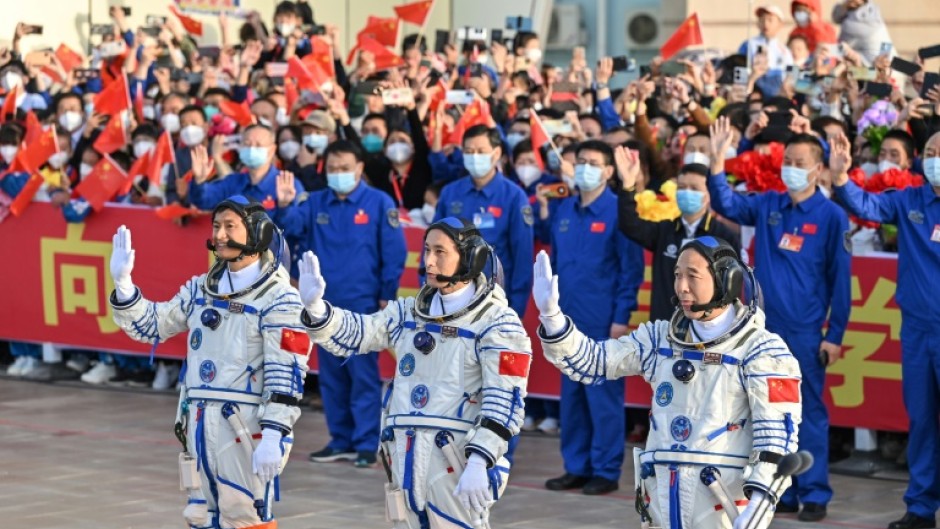
JIUQUAN - China sent three astronauts to its Tiangong space station on Tuesday, putting a civilian into orbit for the first time as it pursues plans to send a crewed mission to the Moon by the end of the decade.
The world's second-largest economy has invested billions of dollars in its military-run space programme in a push to catch up with the United States and Russia.
The Shenzhou-16 crew took off atop a Long March 2F rocket from the Jiuquan Satellite Launch Centre in northwest China at 9:31 am (0131 GMT), AFP journalists and state TV showed.
The launch was a "complete success" and the "astronauts are in good condition", said Zou Lipeng, director of the Jiuquan Satellite Launch Center.
Leading the crew is commander Jing Haipeng on his fourth mission, as well as engineer Zhu Yangzhu and Beihang University professor Gui Haichao, the first Chinese civilian in space.
China was the third country to put humans in orbit, and Tiangong is the crown jewel of its space programme, which has also landed robotic rovers on Mars and the Moon.

Shenzhou-16 is the first mission to Tiangong since it entered its "application and development" stage, authorities said.
The Shenzhou craft will dock at the space station's Tianhe core module.
The crew will then meet their three colleagues from the Shenzhou-15 flight, who have been at the station for six months and will return to Earth in the coming days.
Shenzhou-16 will "carry out large-scale, in-orbit experiments... in the study of novel quantum phenomena, high-precision space time-frequency systems, the verification of general relativity, and the origin of life," CMSA spokesperson Lin Xiqiang told reporters on Monday.
The space station was resupplied with drinking water, clothing, food and propellant this month in preparation for Shenzhou-16's arrival.
One expert told AFP that Tuesday's mission represented "a regular crew rotation flight", but even that was significant.
"Accumulating depth of experience in human spaceflight operations is important and doesn't involve new spectacular milestones all the time," said Jonathan McDowell, an astronomer and astrophysicist at the Harvard–Smithsonian Center for Astrophysics.
- 'Heavenly palace' -
Plans for China's "space dream" have been put into overdrive under President Xi Jinping, and it is planning to build a moon base.

"The overall goal is to achieve China's first crewed landing on the Moon by 2030 and carry out lunar scientific exploration and related technological experiments," CMSA spokesman Lin said.
The final module of Tiangong -- which means "heavenly palace" -- successfully docked with the core structure last year.
The station carries several pieces of cutting-edge scientific equipment, state news agency Xinhua reported, including "the world's first space-based cold atomic clock system".
Tiangong is expected to remain in low Earth orbit at an altitude between 400 and 450 kilometres (250 and 280 miles) for at least 10 years.
It is constantly crewed by rotating teams of three astronauts.
China has been effectively excluded from the International Space Station since 2011, when the United States banned NASA from engaging with the country -- pushing Beijing to develop its own orbital outpost.
China's space agency reiterated on Monday it is actively seeking international cooperation in the project.
Beijing "is looking forward to and welcomes the participation of foreign astronauts in the country's space station flight missions", Lin said.
China plans to send two crewed space missions to Tiangong every year, according to the CMSA.
The next will be Shenzhou-17, with an expected launch in October.
ehl-oho/qan
By Ludovic Ehret

